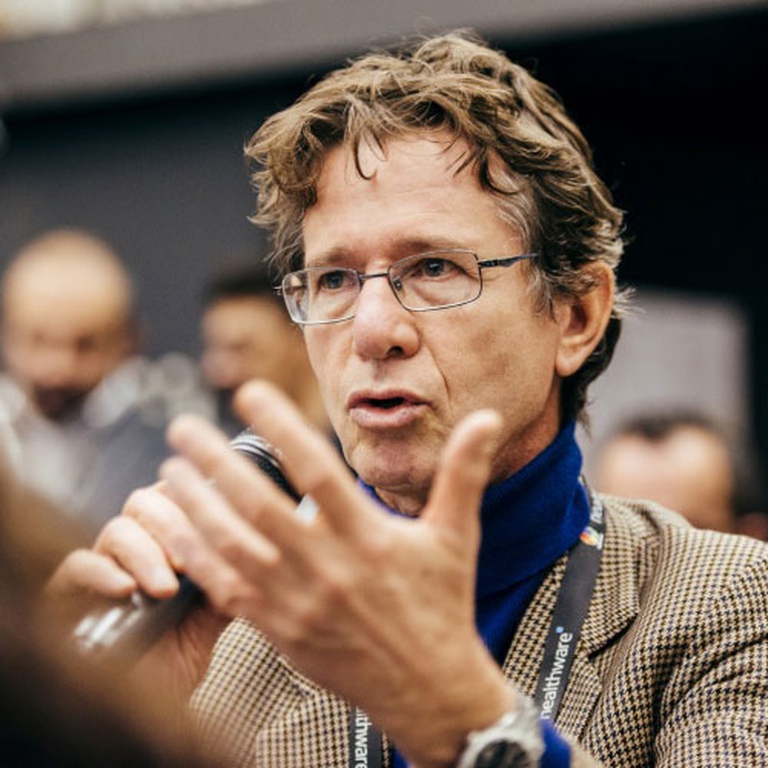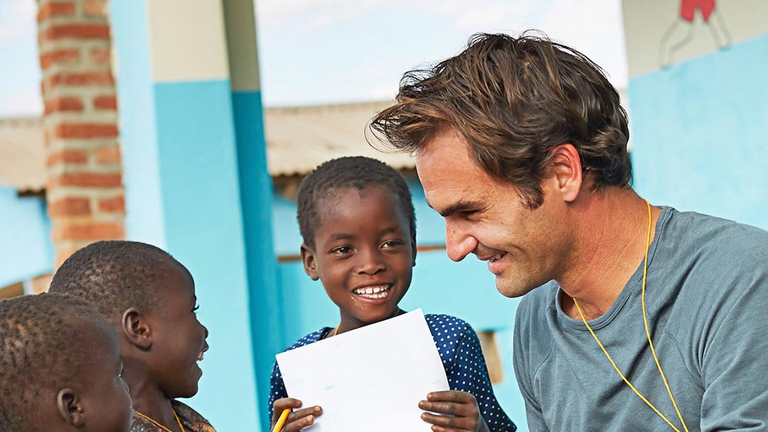
We can learn a lot from philanthropists and families investing their money for the future of all of us. We talk about this with Gamil de Chadarevian, founder of GIST Initiatives.
We talk to Samir de Chadarevian, an expert in sustainable development, philanthropy, impact investing and social innovation.
Wealthy families have a huge amount of assets they could invest through foundations and family offices (i.e. companies specialising in the management of their assets). This means that they also have the power of doing something tangible for the Planet and people. On how and why doing this is investigating “Investing for global impact”, a report published by the Financial Times in partnership with GIST (Global Impact Solutions Today) and with the support of Barclays. The fourth edition, presented in Paris last March, outlines a positive picture in which philanthropy and impact investing are gradually becoming the new normal, instead of the choices of just a few forward-thinking people. We talk about this with Samir de Chadarevian, Research Director of the report with a past as entrepreneur and advisor. Over the years he has specialised in social innovation, impact investing, systemic approach, SDGs (Sustainable Development Goals) and ethics as resources for a sustainable development.
This is a unique report as it involves a specific category of subjects (foundations and family offices) and takes both philanthropy and impact investing into consideration. What’s behind this choice?
Our aim is finding people who are used to act, becoming multipliers. So we have focused on family businesses, family offices and private foundations. These subjects have entrepreneurial skills and a particular attention to the Planet. We focus on entrepreneurs and the assets they invest in their companies as well as in philanthropic activities and social enterprises.
The approach is holistic. We think that one person is at the same time an entrepreneur, an investor, a philanthropist, and a parent: many different roles embodied in one single person. In the same way we think we mustn’t separate philanthropy, impact investing and other investments. For this reason we have specific surveys dedicated to those who aren’t philanthropists or impact investors. This confrontation allows us learning from each other.
Surveys also aim to talk about people, instead of numbers alone. What are the most effective ones?
Exactly: we try to contact the subjects that are seen as a point of reference, such as the Roger Federer Foundation.
An interview that I particularly liked is the one with the foundation of Johnson & Johnson and the Aga Khan Foundation. During the interview, a beautiful expression has come out: unlikely alliances, i.e. partnerships that no one would consider but that are made at last because people realise that they allow to achieve results otherwise out of reach.
Another interesting interview is the one with Simone Cipriani, founder of the Ethical Fashion Initiative, a network of African small artisans who gradually made their way into the international fashion industry. We’re talking about hundreds of small enterprises that now see a different future thanks to an entrepreneur who created a market for them.
What do you expect from this report?
We have great expectations but this is a gradual process. It’s a long-term education and dialogue project that requires taking one step at a time, constantly and energetically. This report aims to reach everybody’s heart and mind, starting from individuals because, luckily, today there are smart and sustainable ways of investing even small amounts of money. Then, it aims to reach the world of business and, at a later time, policy makers, from mayors to ministers and governments.
«Investing for global impact» #Iimpact2 @Paris #YourVoice pic.twitter.com/jTUudTCmlZ
— YourVoiceRH (@YourVoiceRH) 30 marzo 2017
Compared to the first edition of the report, which dates back to four years ago, did you see advancements in the awareness about these themes? Let me say that philanthropy and impact investing are two synergistic issues as they don’t contrast each other. They’re two instruments that can contribute to creating a better world. By joining forces on the same initiatives, they can make sustainable what wouldn’t be in the long run. Starting from this, we can say that awareness is increasing, so much so that the number of participants has doubled. Who started dealing with impact investing five years ago had to struggle to find investment opportunities. Now we have plenty instead. A new school of thought is spreading especially amongst those who pioneered in this field: if we aim to treat all investments in the same way, we must take the positive impacts of impact investing as well as the negative impacts of all other investments into consideration. Technically, they’re called externalities: air, water, roads and all resources that a company uses for its activities without paying for them (or only in part). Governments, therefore citizens, compensate for this use. Who invested in a company obtained dividends, but the community will have to face increased costs (for example in the form of taxes for the public health care system). And these negative impacts aren’t taken into consideration at the moment. If we begin to consider all impacts (both positive and negative), we’ll head towards sustainable investments.
.@europeaid & @ITCnews announce partnership to strengthen fashion value chain & boost #jobcreation in #WestAfrica > https://t.co/jgKhZLxiqX pic.twitter.com/XQSTpRe7pJ
— ITC Ethical Fashion (@_ethicalfashion) 17 febbraio 2017
This is an international survey dedicated to family offices and foundations, which aren’t that common in Italy. How can we see it in the Italian context?
Many people from Italy have taken part in the survey and we have significant examples like San Patrignano, Fondazione Capriplo, and cooperatives. Philanthropy and impact investing are a reality in Italy, even if they’re often perceived differently. The same goes for family offices: they’re different from the Anglo-Saxon model, but this doesn’t mean that there aren’t similar and developed activities.
In Italy there are just a few foundations linked to a well-known personality as they’re more often linked to companies. Is there a development potential in this model of philanthropy?
I think there’s a development potential. An example is Marino Golinelli, a well-known entrepreneur who is showing his face with his foundation, as well as Investimenti Sostenibili LifeGate, which gives the possibility of doing impact investing in a listed fund. There’s a lot going on in Italy but, as in many other markets, more effective steps in the legal framework are needed to better focus and support these initiatives. I’ve entered the world of philanthropy, impact investing and social enterprises seven years ago. There’s a lot going on now and it’s a pleasure to support such vitality and see it growing.
Siamo anche su WhatsApp. Segui il canale ufficiale LifeGate per restare aggiornata, aggiornato sulle ultime notizie e sulle nostre attività.
![]()
Quest'opera è distribuita con Licenza Creative Commons Attribuzione - Non commerciale - Non opere derivate 4.0 Internazionale.
We can learn a lot from philanthropists and families investing their money for the future of all of us. We talk about this with Gamil de Chadarevian, founder of GIST Initiatives.
More and more wealthy families care about our Planet. Data emerged from the Investing for Global Impact prove this.
In the next few months LifeGate will host a series of in-depth analyses on philanthropy and impact investing. This section is supported by Investing for Global Impact, a global research published by The Financial Times in partnership with GIST (Global Impact Solutions Today) and with the support of Barclays. Why philanthropy and impact investing, together In
At the dawn of a new era, women in Japan still face old challenges: they’re paid less than men and struggle to scale the professional ladder. How can the impasse be broken?
Inequality has increased anywhere in the world despite substantial geographical differences, with the richest 1% twice as wealthy as the poorest 50%. The results of the World Inequality Report 2018.
The global gender gap or index has widened, the 2017 World Economic Forum report shows. In view of the International Day for the Elimination of Violence against Women, we analyse how these phenomena are sadly related.
How do wealthy families invest their capital? Fortunately, impact investing is an increasingly common choice. An anticipation of some of the most important findings.
All companies aim to profit, but some of them are doing something for the society. They’re called benefit corporations.
The Bakken or Dakota Access Pipeline (DAPL), an underground oil pipeline project in the United States, is owned by a network of oil and pipeline companies, joint ventures and holding companies. After Trump revived it in January without the consent of the Sioux indigenous tribe affected by it and flouting environmental laws, many investors both from the US









